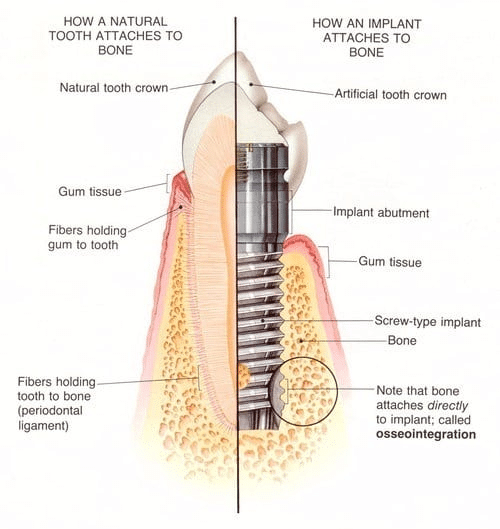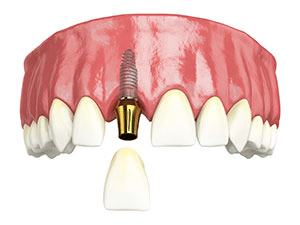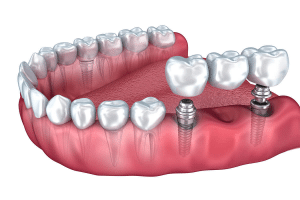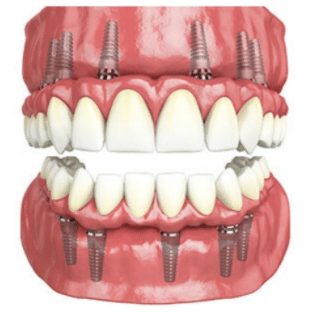DENTAL IMPLANTS
A dental implant typically has 3 components:
- Implant Screw – provides the foundation for the restoration; either teeth or dentures.
- Abutment – provides the connection and the support for the restoration. This attaches to the inside of the screw on one end and to the crown or denture on the other end.
- Restoration – The part of the implant that we use for esthetics and chewing

Implants are a solid treatment option when compared to other methods of treatment like a bridge because they do not require the modification of any otherwise healthy teeth for their support and success. With a bridge, if one of the supporting teeth fails, it usually compromises the whole bridge and leaves for a larger missing space. Studies show that bridges typically become compromised within 10-15 years, where implants are supposed to last a lifetime. But, keep in mind, not all patients are good implant candidates. Regardless of which option you choose, you must be vigilant in keeping the bridge/implant adequately brushed and flossed as well as maintaining your scheduled cleanings and exams.
What makes me a good candidate for dental implants?
- Most people missing one or more functional teeth
- Adequate bone height, width, and density. If not, you many need bone grafting and socket preservation (link) prior to implant placement
- Good oral hygiene
- Patience
What puts me at risk for my implant failing?
- Tobacco Use
- Active Periodontitis (Gum Disease) and Poor Oral Hygiene
- Uncontrolled Diabetes (HbA1c at or below 6 recommended. The lower, the more well-controlled it is and therefore greater chance of implant success)
- Missing hygiene appointments
- Not adequately brushing and flossing around the implant daily
- Autoimmune Diseases
- Long-term use of bisphosphonate medications (i.e.- Fosamax)
- History of Radiation or Chemotherapy
- Insufficient bone


Single Tooth Implants

Implant Supported Bridges

Implant Dentures
- Implant-retained: When the denture snaps into place onto the implants. These are meant to be removable by the patient at home for cleaning
- Implant-supported: These are screwed into a custom milled bar or screw attachment and are only able to be removed by your dentist.
- Benefits of Implant Dentures vs Traditional Dentures
- Dental Implants stimulate your bone just like a natural tooth would and help to preserve your bone level. With years of a traditional denture, you’ll see a less and less accurate fit. Without implants, you’ll eventually have bone and tissues shrink and a space between your denture and tissue will develop making for poor fitting dentures.
- Dental implants provide such a stable foundation so that you will have better biting and chewing power without having to worry about your denture moving around like you may experience with a traditional denture.

To find out more about which service options are best for you, please call (810) 687-5040 or request an appointment online.

